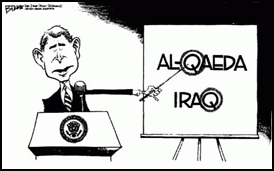Polispeak: July 2007: Archives

When Nancy Pelosi stated that this Democratic Congress would be "the most honest, ethical, and open Congress in history", I'll admit I was skeptical though hopeful. Not long ago, I wrote that the much touted ethics reform seemed to be missing in action but today it looks like the Democrats have delivered much of what they promised with the passage of a comprehensive Ethics Bill.
While it appears that the bill may have omitted some of the reforms that have been discussed and suggested, for the most part, the legislation should be a huge step towards limiting the practice of purse string politics. Additionally, passage of the measure should help to bolster the dismal approval ratings of Congress and provide the Democrats with another achievement to tout in their 2008 election efforts.
The bill, drafted by Democratic leaders, passed by a vote of 411 to 8. It would require House and Senate members to disclose those lobbyists who raise $15,000 or more for them within a six-month period by "bundling" donations from many people. It also would bar lobbyists and their clients from giving gifts, including meals and tickets, to lawmakers.
Senators seeking targeted spending projects or "earmarks" would have to publicize their plans 48 hours before the Senate votes on the proposals in publicly available data bases, and declare their families would not directly benefit financially. The House made similar changes to its rules governing earmarks in January.
House members approved the new legislation even though some privately grumbled that it would complicate their fundraising efforts. Senate leaders expect opposition from some conservative Republicans, but they predicted final passage of the measure by week's end.
Sen. Tom Coburn, R-Oklahoma, signaled the bill will meet resistance in the Senate. It "guts key earmark reforms that both houses of Congress approved overwhelmingly," he said.
Coburn particularly objected to a revision that would allow committee chairmen or the Senate majority leader -- not the Senate parliamentarian -- to rule on whether earmark disclosure requirements have been met.
No doubt there will be efforts to subvert the intent of the bill as politicians, driven by the need to raise campaign funds, will look for loopholes to exploit. Hopefully, the measure can be the first step towards refocusing elected officials on public service and good governance rather than the perpetual need to pander to powerful interest groups who dangle perks in exchange for pledges of financial support.
More importantly, I would hope the renewed focus on ethical behavior would begin to shift voter perceptions. Unfortunately, many voters have become so disenchanted with the state of affairs in Washington that they see little difference between the two parties and therefore even less reason to vote. That complacency has become a tacit acceptance of the bad behavior and an opportunity for politicians to further push the limits of propriety.
Lastly, while many constituents have grown to accept pork barrel politics...the practice of attaching earmarks to legislation for the funding of pet projects intended to benefit those they represent, perhaps politicians can begin to think beyond the narrow objectives that have made it more difficult to pass important measures.
For example, when efforts to require vehicles to achieve better mileage efficiencies are repeatedly defeated by politicians from those districts in which automobile manufacturing is a mainstay of the economy, the goal of reducing our dependence on foreign oil is thwarted. When that happens with virtually every issue, progress on overarching national issues becomes cumbersome, if not impossible.
Hopefully, this step towards reform will reduce the influence of special interest groups and allow elected officials to address important issues that have become mired down in the minutiae of manipulative lobbying.
For this legislation to work, voters will also need to adjust their "what's in it for me" mindset. The days of overlooking the unethical actions of one's representative because he or she was able to "bring home the bacon" must cease to exist. While it is easy to blame our elected officials, isn't it also time for voters to admit our role as enablers and recommit ourselves and our country to the advancement of the greater good?
Tagged as: Corruption, Earmarks, Ethics Reform, House of Representatives, Lobbying, Nancy Pelosi
Daniel DiRito | July 31, 2007 | 11:43 AM |
link
| Comments (0)



Michael O'Hanlon and Kenneth Pollack, write an upbeat assessment of the situation in Iraq in today's New York Times...with an even more optimistic headline, "A War We Just Might Win". After eight days in the war torn country, they conclude that progress is being made, troop morale is high, and sectarian groups are beginning to cooperate in order to bring security.
At the same time, the Iraqi parliament announced today that it would begin a lengthy vacation despite the lack of progress on a number of critical issues that have remained stalled in the struggling government. The vacation is scheduled to end on September 4th...just days prior to the much anticipated U.S. assessment intended to evaluate the effectiveness of the recent troop surge.
Perhaps O'Hanlon and Pollack failed to get the memo announcing the extended vacation...the same memo that suggests that even if the troop surge is able to bring improved security, the Iraqi government may well be incapable of stepping in and governing. Oh, and keep in mind that this is the same government that has refused to take control of numerous reconstruction projects that have been completed because they simply lack the ability and the expertise to do so.
From The New York Times:
Here is the most important thing Americans need to understand: We are finally getting somewhere in Iraq, at least in military terms. As two analysts who have harshly criticized the Bush administration’s miserable handling of Iraq, we were surprised by the gains we saw and the potential to produce not necessarily “victory" but a sustainable stability that both we and the Iraqis could live with.
Another surprise was how well the coalition’s new Embedded Provincial Reconstruction Teams are working. Wherever we found a fully staffed team, we also found local Iraqi leaders and businessmen cooperating with it to revive the local economy and build new political structures. Although much more needs to be done to create jobs, a new emphasis on microloans and small-scale projects was having some success where the previous aid programs often built white elephants.
Well that settles it...I need to call my representatives in Washington and urge them to support the President in his determination to stay in Iraq as long as he deems necessary. Look, I have no doubt the added troops have made some marked improvements but we've been here before and the problem remains the same...there are few reasons to believe that the Iraqi's are going to be able to govern once we reduce our presence.
Well over four years into the conflict and the Iraqi security forces appear no more able to maintain the security of Iraq than they were each prior time the Bush administration projected that they would be. Perhaps O'Hanlon and Pollack received a personal assurance from the President?
From Reuters:
BAGHDAD (Reuters) - Iraq's parliament went into summer recess for a month on Monday despite failing to enact a series of laws that Washington sees as crucial to stabilizing the country and reconciling warring Iraqis.
"We do not have anything to discuss in the parliament, no laws or constitutional amendments, nothing from the government. Differences between the political factions have delayed the laws," Kurdish lawmaker Mahmoud Othman told Reuters.
"Bush cannot realistically go to Congress and say he has to keep U.S. troops there because the Iraqi government is doing a good job -- because the government is largely absent. It places him in a very difficult predicament," said Gareth Stansfield, an analyst at leading British think-tank Chatham House.
Washington has pressed the Iraqi government to speed up passage of laws that include measures to distribute Iraq's oil reserves and ease restrictions on former members of Saddam Hussein's Baath party serving in the civil service.
It views such laws as key to reconciling disaffected members of Iraq's Sunni Arab community, once politically dominant under Saddam and now locked in a vicious sectarian conflict with majority Shi'ites that has killed tens of thousands.
Is Reuters talking about the same country? Maybe I'm dense, but what would make the impartial observer conclude that success is just over the horizon? It looks like Reuters stopped their analysis one ridge short of the magnificent Mesopotamian miracle...you know...that place behind the curtain where the wizard walked O'Hanlon and Pollack through the tangible transformation that is taking place.
Frankly, if victory is proving that 160,000 American troops can have an impact on a nation in a virtual civil war...well...maybe we're ready for a ticker tape parade. On the other hand, isn't it possible that victory would best be equated with a certainty that, upon the withdrawal of U.S. troops, Iraq can thrive as a functional nation?
Even the rose colored glasses of O'Hanlon and Pollack only warrant the following conclusion.
In the end, the situation in Iraq remains grave. In particular, we still face huge hurdles on the political front. Iraqi politicians of all stripes continue to dawdle and maneuver for position against one another when major steps towards reconciliation — or at least accommodation — are needed. This cannot continue indefinitely. Otherwise, once we begin to downsize, important communities may not feel committed to the status quo, and Iraqi security forces may splinter along ethnic and religious lines.
How much longer should American troops keep fighting and dying to build a new Iraq while Iraqi leaders fail to do their part? And how much longer can we wear down our forces in this mission? These haunting questions underscore the reality that the surge cannot go on forever. But there is enough good happening on the battlefields of Iraq today that Congress should plan on sustaining the effort at least into 2008.
Call me a cynic but the ongoing admonitions to "give it six more months"...the many assurances that "we're beginning to see progress"...and the optimistic assertions that "the Iraqi people are happily embracing democracy" are all akin to lathering lipstick on a pig...you know, those animals that don't have lips...those cuddly creatures that no one's inclined to kiss even if they did.
I have empathy for the Iraqi people and I wish them well...but I'm struggling to understand how many U.S. soldiers should give their lives so that the Bush administration can take another shot at convincing the American public that our government is bringing home the bacon...as opposed to feeding us another batch of baloney.
Image courtesy of www.hillquest.com
Tagged as: al Qaeda, Iraq, Kenneth Pollack, Micheal O'Hanlon, Sectarian, U.S. Troops
Daniel DiRito | July 30, 2007 | 3:22 PM |
link
| Comments (1)



They say it’s not nice to enjoy the misfortune of others...and while I generally support that notion...when it comes to politics, I'm willing to make some exceptions. I have to confess that a New York Times article discussing the predicament facing the Republican Party in the 2008 presidential election with regards to the issue of abortion makes me happy.
That is not to say that the issue of abortion should make anyone happy; rather it is to say that I'm pleased that GOP voters are having to confront the issue with a level of practicality that has been absent from their equation for many years. I find the potential for lessening the influence of absolutism a welcome change.
Six months before the Iowa caucuses, abortion opponents are trying to adjust to a strikingly different political landscape. For the first time in a generation, they face in Rudolph W. Giuliani, the former mayor of New York, a front-runner for the Republican nomination who supports abortion rights.
Most of the Republican candidates are scrambling to demonstrate both their anti-abortion credentials and their ability to win. Phyllis Schlafly, the conservative stalwart, said she sensed “concerns" at the grass roots about all the candidates at the front of the pack.
What many abortion opponents say they crave these days is certainty. Analysts say the Supreme Court could now be just a vote or two away from a major rollback of Roe v. Wade, the 1973 Supreme Court decision declaring a constitutional right to abortion. But the next president will be crucial.
Hadley Arkes, a professor at Amherst College and a leading social conservative legal thinker, said he had recently gotten “feelers" from some in the Giuliani camp. But Mr. Arkes, an opponent of abortion, said he could not fathom a way the party could nominate Mr. Giuliani and remain the same “pro-life" party it has been for 25 years.
“You change the constituency of the party," Mr. Arkes said — either by showing that anti-abortion voters are not necessary to win, or by showing that anti-abortion voters are willing to subsume their cause to other issues.
Even so, Andrew Kohut, president of the Pew Research Center, said recent poll analysis suggested that some anti-abortion voters may be willing to consider that possibility.
For far too long the issue of abortion has been characterized as an all or nothing construct...one that ignores the realities of the human condition and that places an unwarranted emphasis on one narrow aspect of morality...which often disregards numerous other concerns deserving of consideration and attention.
I understand the argument made by those opposed to virtually all abortions and I realize that their beliefs are not apt to allow for some degree of flexibility. Notwithstanding, those beliefs do not comport with reality and if the 2008 election can force a meaningful dialogue that leads to the entertainment of some reconsideration, then I'm all for it.
Those opposed to abortion are frequently opposed to contraception, against comprehensive sex education, and in favor of abstinence pledges as a means to combat unwanted pregnancies...and the immorality they attach to sexuality. Portraying sex as wrong and immoral, in my opinion, contributes to the problem. Instead of giving young people a healthy perspective on sexuality, it promotes deceit and denial...both of which establish sex as a forbidden pleasure rather than as an expression of love.
If the 2008 election can serve as an impetus to change this antiquated construct and signal the beginning of the end to this virtual demonization of sex, perhaps we will have turned the corner on thirty years of the politics of regression and repression. I'm all for finding ways to reduce the number of abortions...but not by adopting the mentality of moral measurement and criminal consequence that has permeated the Republican Party.
If the current GOP candidates fall short of the ingrained standard, perhaps it will force fundamentalists to consider the views of those they routinely discount as inadequate and intolerable. Unfortunately, I'm afraid many Christian conservatives are going to have to be led to this newly emerging reality kicking and screaming.
In the meantime, pardon me for taking pleasure in the contortions that will inevitably illuminate the intransigence that has dominated the issue. My sarcastic side wants to watch the GOP candidates prostitute themselves to a constituency that seems to abhor all things remotely sexual. Indeed, before it’s over, it should make for some rather strange bedfellows. Rather tawdry, don't you think?
Image courtesy of MSNBC
Tagged as: 2008 Presidential Election, Abortion, Giuliani, GOP, Religion, Roe v. Wade, Romney, Sexuality, Thompson
Daniel DiRito | July 30, 2007 | 11:54 AM |
link
| Comments (0)



Sometimes comparison proves to be the best means to understand the intentions of those who have been elected to public office…especially since the spoken word is often the tool by which politicians manipulate voters. When it comes to understanding President Bush, comparison is necessary…and the results offer a string of contradictions that defy the rhetoric of compassionate conservatism.
In a New York Times article, Paul Krugman provides readers a look into the position of the President with regard to the expansion of programs to cover uninsured children…programs that the President supported in the past…but programs that the President is opposed to expanding despite their success.
When a child is enrolled in the State Children’s Health Insurance Program (Schip), the positive results can be dramatic. For example, after asthmatic children are enrolled in Schip, the frequency of their attacks declines on average by 60 percent, and their likelihood of being hospitalized for the condition declines more than 70 percent.
Regular care, in other words, makes a big difference. That’s why Congressional Democrats, with support from many Republicans, are trying to expand Schip, which already provides essential medical care to millions of children, to cover millions of additional children who would otherwise lack health insurance.
But President Bush says that access to care is no problem — “After all, you just go to an emergency room" — and, with the support of the Republican Congressional leadership, he’s declared that he’ll veto any Schip expansion on “philosophical" grounds.
The House plan, which would cover more children, is more expensive, but it offsets Schip costs by reducing subsidies to Medicare Advantage — a privatization scheme that pays insurance companies to provide coverage, and costs taxpayers 12 percent more per beneficiary than traditional Medicare.
Strange to say, however, the administration, although determined to prevent any expansion of children’s health care, is also dead set against any cut in Medicare Advantage payments.
Well, here’s what Mr. Bush said after explaining that emergency rooms provide all the health care you need: “They’re going to increase the number of folks eligible through Schip; some want to lower the age for Medicare. And then all of a sudden, you begin to see a — I wouldn’t call it a plot, just a strategy — to get more people to be a part of a federalization of health care."
Looking at this particular situation offers ample opportunities for relevant and informative comparisons. First, let me suggest that the President’s position is neither conservative nor compassionate. There has been little disagreement that George Bush’s Medicare prescription drug program was the largest expansion of entitlements in recent memory and most analysts believe it will cost far more than the original estimates.
On its surface, one might argue that adding a prescription drug benefit was an act of compassion…and to a degree that conclusion has some merit. However, this is where comparison becomes an enlightening tool.
It is well known that the President is in favor of privatizing entitlement programs and one could argue that the prescription drug benefit was a logical step in that direction and likely the only means by which he could initiate such a plan…given that is has the appearance of compassion. One can look at the high costs of the program as the essential seed money for turning the corner towards privatization.
As we know, the program has been viewed to have achieved mixed results but there is no doubt that it provided insurance companies with a subsidized entrée into the living rooms of millions of Americans. Let me attempt to explain. The prescription drug benefit allows those on Medicare to purchase the benefit from an array of private providers…a move that begins to put in place a ready made structure for further privatization.
Such a plan achieves two important goals for a President in favor of privatization. One, it begins to give insurance companies an expanding role in providing care for the millions of seniors on Medicare…a move that is good for large corporations in the business of health care…including drug manufacturers. Two, it is an important incremental step in taking the government out of the health care business and entitlement programs.
Coming back to the Schip program, one can begin to use comparisons to uncover actual motivations. The number of uninsured Americans is well documented as a politically charged issue. In approving a plan to cover a number of uninsured children, the President achieved points for compassion just as he did with the prescription drug benefit. These programs also helped to hold off calls for universal government health care…a direction which this President opposes.
When one looks at the Bush administration position on the relative costs for the Schip plan and Medicare Advantage, we see that compassion and conservatism are secondary to the ideology of privatization. Granted, one could argue that the ultimate goals of the measures endorsed by the President have conservatism at their core…meaning less government and more market determined programs and costs.
In that regard, perhaps these spending measures…which are seemingly incongruent with conservatism…and which have raised the ire of traditional conservatives…have been shrewd considerations and calculations on the part of the President intended to push the country towards more privatization.
Now, why should Mr. Bush fear that insuring uninsured children would lead to a further “federalization" of health care, even though nothing like that is actually in either the Senate plan or the House plan? It’s not because he thinks the plans wouldn’t work. It’s because he’s afraid that they would. That is, he fears that voters, having seen how the government can help children, would ask why it can’t do the same for adults.
And there you have the core of Mr. Bush’s philosophy. He wants the public to believe that government is always the problem, never the solution. But it’s hard to convince people that government is always bad when they see it doing good things. So his philosophy says that the government must be prevented from solving problems, even if it can. In fact, the more good a proposed government program would do, the more fiercely it must be opposed.
This sounds like a caricature, but it isn’t. The truth is that this good-is-bad philosophy has always been at the core of Republican opposition to health care reform. Thus back in 1994, William Kristol warned against passage of the Clinton health care plan “in any form," because “its success would signal the rebirth of centralized welfare-state policy at the very moment that such policy is being perceived as a failure in other areas."
But it has taken the fight over children’s health insurance to bring the perversity of this philosophy fully into view.
Krugman’s analysis is valid but perhaps it stops short of identifying the ultimate misconceptions that underlie such a philosophy. George Bush is no doubt a product of privilege and in that reality his ability to comprehend the struggles of those at the opposite end of the spectrum is undoubtedly insufficient.
There is an inherent risk for those who "have" to infer that those who "have not"…deserve not…that what they lack results from their lack of effort and that if they are coddled by the government, they will never demonstrate the necessary initiative to alter their situation absent the assistance of the government.
Clearly, there have been situations that have given such arguments credibility…particularly the welfare reform seen in the 1990’s (though one could argue that the strong economy played a larger role in that success than the simple act of refusing to toss people a government subsidized lifeline).
Regardless, refusing to provide care to needy children seems to be punishing the innocent amongst us for all of the wrong reasons. Ideology aside, children lack the ability or the autonomy to effect their status. Allowing them to be political pawns seems wrong by whatever comparative means one may choose to employ.
Sadly, I view this situation as one of many examples whereby George Bush has demonstrated his predisposition to implement and impose his absolute ideological views despite the detrimental impact they may inflict upon those who do not serve to advance his narrow objectives.
Tagged as: Children, Congress, George Bush, Healthcare, Medicare, Paul Krugman, Privatization, Schip
Daniel DiRito | July 30, 2007 | 10:42 AM |
link
| Comments (0)


The following two video clips are from the PBS program, Bill Moyers Journal, and they are the second part of a two part posting at Thought Theater. The first half can be found here.
The first video clip is the completion of the discussion outlined below which appeared in the first posting. The second clip is Moyers own reflections on the war in Iraq. It is a poignant segment that highlights the service of a soldier who lost his life in Iraq against the statements recorded by Max Blumenthal at the College Republican National Convention.
It is startling to see the degree to which these young Republican's have adopted the rhetoric of the Bush administration. This final segment also leaves one to wonder how many of those who endorse this war would actually be willing to make the sacrifice to serve in the U.S. military. In using the Blumnethal clip, Moyers provides an illumination of these subtle but significant distinctions.
From the prior posting:
This latest edition of the Journal had an excellent segment titled Al Qaeda And Iraq...a discussion with Fawaz Gerges, author of two books, The Far Enemy: Why Jihad Went Global and Journey Of The Jihadist: Inside Muslim Militancy and Brian Fishman, a Senior Associate at the Combating Terrorism Center at West Point.
This is one of the most informative conversations on the situation in Iraq, the war on terror, and the many complex obstacles which the United States faces in dealing with the inhabitants of the Middle East.
Anyone who has listened to the Bush administration's simplistic characterization of the Iraq situation or the war on terror should watch this program. Frankly, I doubt anyone can come away from watching this discussion and feel better about the daunting task the United States undertook with the invasion of Iraq. Further, it would be very difficult to conclude that the latest strategy will succeed or that the President has faced up to the enormity of the situation.
Tagged as: al Qaeda, Bill Moyers, Brian Fishman, Fawaz Gerges, Iraq, Islam, Middle East, War On Terror
Daniel DiRito | July 29, 2007 | 5:47 PM |
link
| Comments (0)


The following two video clips are from the PBS program, Bill Moyers Journal, and they are the first part of a two part posting at Thought Theater. The second half will be posted later this evening.
This latest edition of the Journal had an excellent segment titled Al Qaeda And Iraq...a discussion with Fawaz Gerges, author of two books, The Far Enemy: Why Jihad Went Global and Journey Of The Jihadist: Inside Muslim Militancy and Brian Fishman, a Senior Associate at the Combating Terrorism Center at West Point.
This is one of the most informative conversations on the situation in Iraq, the war on terror, and the many complex obstacles which the United States faces in dealing with the inhabitants of the Middle East.
Anyone who has listened to the Bush administration's simplistic characterization of the Iraq situation or the war on terror should watch this program. Frankly, I doubt anyone can come away from watching this discussion and feel better about the daunting task the United States undertook with the invasion of Iraq. Further, it would be very difficult to conclude that the latest strategy will succeed or that the President has faced up to the enormity of the situation.
Tagged as: al Qaeda, Bill Moyers, Brian Fishman, Fawaz Gerges, Iraq, Islam, Middle East, War On Terror
Daniel DiRito | July 29, 2007 | 5:09 PM |
link
| Comments (0)



While many observers are debating the effectiveness of the latest troop surge in Iraq, an even more disturbing issue may be developing…one that could lead to the complete unraveling of what is already a relatively dysfunctional government. Conflict is nothing new to the fledgling government, but current events could be the final impetus in toppling the already weakened Maliki led coalition.
BAGHDAD - Iraq is in the throes of its worst political crisis since the fall of Saddam Hussein with the new democratic system, based on national consensus among its ethnic and sectarian groups, appearing dangerously close to collapsing, say several politicians and analysts.
This has brought paralysis to governmental institutions and has left parliament unable to make headway on 18 benchmarks Washington is using to measure progress in Iraq, including legislation on oil revenue sharing and reforming security forces.
On Wednesday, the Iraqi Accordance Front said it pulled out of Mr. Maliki's coalition government, but would return its six cabinet members if the prime minister met a list of demands. The Sunni bloc says it wants, among other things, pardons for detainees not facing specific criminal charges and for all militias to be disbanded.
If they pull out, it would bring to 12 the number of vacancies in Maliki's 39-member cabinet.
Simple math tells us that if nearly a full third of the government is on the verge of withdrawal, the Maliki government is perilously close to failure. Numerous critics of the war, including many within the Democratic Party and a few Republican defectors, have been arguing that the situation in Iraq cannot be solved militarily and that it must be addressed primarily through political diplomacy and reconciliation.
However, the truth of the matter is that the Bush administration continues to sell the continuing U.S. occupation, as well as the recent troop surge, on the grounds that Iraq has become the central front in the war on terror. Unfortunately, that argument continues to ignore the fundamental issue that will ultimately need to be resolved in order to establish an Iraqi national identity...sectarian differences.
The apparent shortsightedness of the President is either a grave flaw or he has elected to string the American public along with a military rationale knowing full well that the task at hand is much larger and will require many more years of U.S. involvement and oversight…a position he likely realizes would not be palatable to an already reluctant citizenry. Either way, the goal of a democratic Iraq is more likely a function of fiction than a calculation of fact.
And since Saturday, US Ambassador Ryan Crocker has been shuttling between Iraq's top leaders, but an embassy spokesperson said this was not necessarily indicative of a crisis.
"The surge has done well in making a difference in security conditions. But it isn't a light switch for reconciliation; there are no quick fixes to years of bitterness and violence," he said.
Robert Springborg, director of the Middle East Institute at the University of London, says the heart of the problem was that no one is truly committed to a strong and unified government.
"The actors involved have their own agendas, the central government and its resources are a tool for their own aspirations ... none are committed to a government for all Iraqis," he says.
Pointing to the growing disconnect between Washington and Baghdad, Askari, Maliki's adviser, says, "Washington believes that passing the oil law will impact on reconciliation and the security situation. We beg to differ. This matters little to the armed groups that kill Iraqis every day. Their sole agenda is to reverse what we have achieved so far."
Despite my intense criticism of the Bush administration, I do realize that the United States faces a difficult predicament now that we have toppled the Hussein regime. Nonetheless, the initial miscalculations, coupled with a seemingly persistent and unyielding stubbornness, have simply served to compound the ongoing dilemmas we have faced and will therefore continue to face.
When that basic reality is added to the intransigent and arrogant nature of the neocon mindset…a mindset that has been allowed to influence each decision…it is difficult to predict the point at which an honest evaluation can be completed…let alone when such an evaluation can be used as the backdrop for real discussions and meaningful solutions.
Whether the Bush administration will ever acquiesce to such an approach remains the critical factor. All signs suggest that moment remains a very distant and doubtful dream. In the meantime, the American public will no doubt have to endure more of the Bush administration’s ongoing nightmare…an American administration in denial and a dysfunctional and divided Iraq.
Tagged as: George Bush, Iraq, Neocon, Nouri al-Maliki, Sectarian, Shiite, Sunni
Daniel DiRito | July 27, 2007 | 3:32 PM |
link
| Comments (0)



A new George Washington University Battleground Poll ought to be a warning to both political parties that they need to clean up their acts and get about the work they were elected to achieve. Judging from the bleak numbers, voters feel that the message they delivered in 2006 has fell upon deaf ears. While the Democrats fared somewhat better than the Republicans, neither party should take comfort in their prospects as we approach the 2008 election.
The George Washington University Battleground Poll found widespread disillusionment among voters, with 71 percent of those surveyed saying their member of Congress put partisan politics ahead of voters' actual concerns.
Lawmakers as a whole fared even worse: 93 percent of voters' surveyed said members of Congress put partisan politics first.
"The election of 2006 was in the point of view of many Americans a failure in that it has not changed the direction of politics," said Christopher Arterton, a university dean and political expert at George Washington.
A record 70 percent said the country was on the wrong track.
Top criticisms included the inability of Democrats to pass meaningful legislation and change the course of the war in Iraq.
"The country wants change and they're not seeing change from either party," Democratic pollster Celinda Lake told the news conference. "Thank God Democrats get to vote against somebody."
Lake's remark may console some Democrats but the reality is that the American political atmosphere has become little more than a series of partisan skirmishes...skirmishes that are played out in virtually scripted performances on center stage by actors who do little more than mouth their lines and collect their inflated paychecks.
No doubt the poll numbers suggest that voters feel their growing cynicism is valid and it goes without saying that politicians have done little since the 2006 election to warrant any measurable vindication.
Given the impression by many voters that the two parties are distinguishable by name only, is it any wonder as to why voter turnout is so dismal in the United States? Time and again the pundits contend that a third party could never succeed...but I suspect the margin by which that may be true has shrunk significantly in the last few years.
American voters are amazingly patient...but one would likely be foolish to argue that we aren't approaching the juncture at which something will have to give. Drawing from the terminology of our uniquely American sport of football, let's hope we're able to bend before we break.
Tagged as: Congress, Democrat, George Washington Battleground Poll, Republican, Voter Opinion
Daniel DiRito | July 26, 2007 | 4:39 PM |
link
| Comments (0)



While the decider in chief runs about the country spouting the dangers of al Qaeda “IN" Iraq, virtually all other experts on the subject are pointing to Pakistan and just how difficult and daunting it will be for anyone to flush them out of their remote hideouts. The latest expert to voice such concerns is James Clapper, an intelligence expert with the Pentagon.
"I think our objective will be to neutralize, not eliminate, but certainly make this safe haven -- as we have the others -- less safe and less appealing for AQ," Clapper told a joint session of the House armed services and intelligence committees.
But Clapper, undersecretary of defense for intelligence, presented the task of eliminating al Qaeda's influence in the region as a long-term project that would hinge on U.S. economic aid to the local populace and contributions of military assistance including sophisticated surveillance equipment to the Pakistani military.
"This is going to be a long-haul process," he said. "I don't think we'll have any demonstrable change within (a) three-year time frame."
Added Clapper, "It's not just ... putting bombs on targets."
"Al Qaeda is now in a part of Pakistan that is largely inaccessible to Pakistani forces, the Pakistani government. Always has been. And it is a very difficult operating environment for them," said Edward Gistaro, the top U.S. intelligence analyst on transnational threats.
"It is just a very difficult environment for outside forces to operate in," he added.
For me, the most notable information offered regarding the situation in Pakistan is the statement that we shouldn’t expect any demonstrable change in the next three years. If one endeavors to put two and two together, then the reports suggesting that al Qaeda may be poised to attempt another strike against the United States become more troubling. If the planning for such a strike is being administered from Pakistan, then should we assume that for the next three years we lack the means to significantly disrupt that activity?
Perhaps the focus of the Bush administration on Iraq is a distraction intended to lull al Qaeda in Pakistan into complacency in order to allow the United States to execute a clandestine strike. What’s more probable is that I’m grasping at straws in my search for any shards of logic which I can then attach to the President’s incongruous rhetoric and his indiscernible rationale.
If the situation turns out to be the former, I’ll happily offer the President kudos. If on the other hand, the latter were to prove accurate…well…that would simply be more of the same. I hope I’m pleasantly surprised.
Tagged as: al Qaeda, George Bush, Musharraf, Pakistan, Pentagon, War On Terror
Daniel DiRito | July 26, 2007 | 1:56 PM |
link
| Comments (1)



On Tuesday, the President sought to portray al Qaeda in Iraq as the central threat in the war on terror. His actions were apparently meant to shore up waning support for his war in Iraq and to respond to a grim National Intelligence Estimate, portions of which were released least week.
By and large, the President has relied on one paragraph of the estimate to make his assertions. However, the remaining portions of the report which were made available to the public suggest that it is actually the al Qaeda enclaves in the remote regions of Pakistan which pose the greater threat to the U.S. homeland.
While it should come as no surprise that the President would attempt to spin the NIE report to meet his own objectives (think about the selective justifications for invading Iraq), one has to wonder about the moral of the individuals who participate in compiling and delivering reports like the National Intelligence Estimate and the Iraq Study Group Report.
Frankly, I have to presume that these public servants feel marginalized and maligned. Time and again, this President has either mischaracterized information or simply chosen to ignore it…despite the obvious credibility of those who have endeavored to provide objective data intended to assist in guiding the policy decisions of the Bush administration.
Today, the Boston Globe gives readers a glimpse into the thoughts of one such individual who was a key participant in preparing the NIE report.
In rare testimony before two House committees, Edward Gistaro, the national intelligence officer for transnational threats, said that Al Qaeda terrorists operating in South Asia are better equipped to attack the United States than the network's followers in Iraq are.
Asked which arm of Al Qaeda concerned him the most, Gistaro told a joint session of the House armed services and intelligence panels that it was South Asia.
"The primary concern is in Al Qaeda in South Asia organizing its own plots against the United States," he said. Al Qaeda planned the Sept. 11, 2001, attacks from its bases in Afghanistan.
The top leaders of the terrorist network, Gistaro added, are "able to exploit the comfort zone in the tribal areas" of Pakistan and Afghanistan and are "bringing people in to train for Western operations."
Meanwhile, a top US general in Afghanistan told Pentagon reporters in a video teleconference that the number of Al Qaeda foot soldiers traveling to South Asia has increased up to 60 percent over the past year.
"It's increased probably 50 to 60 percent over what it was last year . . . and they come from multiple areas in the Middle East," said Army Major General David Rodriguez, commander of the 82d Airborne Division.
I don’t begrudge the President believing that we can’t walk away from the war in Iraq without some confidence that the troubled and divided nation won’t further unravel. Nonetheless, I find the methodology he incorporates into communicating his position to be mind boggling and counter productive.
Unfortunately, a quick review of his political mindset…as evidenced by the manner in which he and his operatives have chosen to approach elections and partisan political issues…suggests that candor and compromise have always been forced to yield to conflation and confrontation. Even worse, when the latter fail to succeed, this President seems chillingly comfortable employing denial, deceit, and dictatorial disregard.
But in recent days the White House has highlighted one particular line in the declassified version of the report that portrays the group known as Al Qaeda in Iraq as the "most visible and capable affiliate [of Al Qaeda] and the only one known to have expressed a desire to attack the [US] homeland."
"We've already seen how Al Qaeda used a failed state thousands of miles from our shores to bring death and destruction to the streets of our cities, and we must not allow them to do so again," Bush said.
Abraham Wagner, a senior researcher at the Center for Advanced Studies on Terrorism at Columbia University, called Bush's speech about the Al Qaeda threat in Iraq a "spin job."
"In the Cold War it was called 'threat lumping,' " Wagner said. "It is creating a threat to justify what you are doing. Al Qaeda in Iraq never existed prior to the US activity in Iraq and I think it is still a small operation."
"It is unfortunate," he added, that "the administration, in their last gasp to justify what they are doing, are inventing threats and misrepresenting what they are getting from the intelligence community."
Astonishingly, when the President alludes to al Qaeda using a failed state in an attempt to justify his Iraq strategy, he simultaneously ignores the events unfolding in Pakistan…events that are far too obvious to be ignored or swept under the rhetorical rug. Certainly the President is entitled to construct his argument as he chooses, but he insults the American voter each time he bangs the same tired old drum.
While voters may have listened and lined up to follow patriotically prior to the Iraq invasion…I’m of the mind that they view the incessant clamor coming from the Bush administration to be synonymous with the protestations they’ve come to expect from the likes of a precocious child who valiantly argues he or she didn’t eat the cookies while coyly wiping chocolate chips from his or her cheeks.
Each time George Bush seeks to inject his alter-reality into the voter psyche…whether it be attempted with a crow bar or perched on the bar crowing…he pushes himself further away from the “sheep" he seeks to influence.
Mr. President, you can wrap yourself in whatever wondrous wares you choose but the American public has seen you for what you are…and you are little more than the inauthentic boy wolf wrapped in sheep’s clothing whose cries for credibility are no longer reputable...and they no longer resonate.
Tagged as: al Qaeda, Edward Gistaro, George W. Bush, Iraq, Iraq Study Group, NIE, Pakistan
Daniel DiRito | July 26, 2007 | 11:15 AM |
link
| Comments (0)



In response to President Bush's refusal to allow the testimony of Josh Bolten and Harriet Miers in the U.S. Attorney firing investigation, the House Judiciary Committee has voted to issue contempt of Congress citations. The committee vote in favor if the issuance was 22-17.
The 22-17 vote — which would sanction for pair for failure to comply with subpoenas on the firings of several federal prosecutors — advanced the citation to the full House.
Committee Chairman John Conyers said the panel had nothing to lose by advancing the citations because it could not allow presidential aides to flout Congress' authority. Republicans warned that a contempt citation would lose in federal court even if it got that far.
"If we countenance a process where our subpoenas can be readily ignored, where a witness under a duly authorized subpoena doesn't even have to bother to show up, where privilege can be asserted on the thinnest basis and in the broadest possible manner, then we have already lost," Conyers, D-Mich., said before the vote. "We won't be able to get anybody in front of this committee or any other."
With Conyers' statement, more prescient words could not have been spoken. In fact, one has to wonder if Conyers' fears are exactly the objective of the Bush administration. If the recent statements that have come from the White House are an indication of their willingness to negate the authority of Congress, the voting public should prepare for an historical showdown.
Conyers' predecessor, former Chairman James Sensenbrenner, R-Wis., argued that Democrats can't win that fight.
A civil lawsuit in federal court would be less perilous for the balance of power between the executive and legislative branches, he said, than a constitutional battle over contempt.
"I think that the White House is going to win an argument in court" over the contempt matter, Sensenbrenner told the panel.
If history and self-interest are any guide, the two sides will resolve the dispute before it gets to federal court. Neither side wants a judge to settle the question about the limits of executive privilege, for fear of losing.
But no deal appeared imminent.
I could be wrong, but the notion of making "deals" doesn't seem to appeal to this President. He is much happier with absolute authority and the actions of the Vice President and other members of his administration are a testament to the long held belief that expanding the power of the executive branch remains a priority.
History has shown that there is often great irony attached to battles of this nature. More often than not, those men and women who seek to accumulate more power are frequently the least capable to properly administer said power.
It is thought by many that George Bush is concerned about his legacy. While it is clearly too early to draw any certain conclusions, I suspect that history will add George Bush to the list of men and women whose craving for power far exceeded their capacity to command it.
In the meantime, the American public will be forced to watch as he attempts to pile his plate with power. Now I'm not an expert on Christian doctrine...but somewhere in the back of my mind I recall a discussion of seven deadly sins...and I'm almost certain that gluttony was on that list.
Perhaps I'm wrong, but could it be possible that I just acquired a better understanding of what George Bush means when he says, "Bring it on!"?
Image courtesy of Edmonton Public Schools
Tagged as: Balance of Power, Contempt of Congress, Executive Power, George Bush, Harriet Miers, John Conyers, Josh Bolten
Daniel DiRito | July 25, 2007 | 11:05 AM |
link
| Comments (0)



UPDATE:
The Regents of the University of Colorado have voted 8-1 to fire controversial professor Ward Churchill. I am updating a prior posting on Churchill now that he has been fired.
Anyone interested in listening to an excellent conversation between the professor and a local television reporter prior to his firing should definitely follow the link below. It offers an unbiased look at Churchill and gives the viewer more than the highly charged hype found in the press.
BOULDER — The University of Colorado's Board of Regents today fired professor Ward Churchill, 2 1/2 years after his comments about the victims of the 9/11 attacks sparked a firestorm.
University president Hank Brown, in a news conference, said "the decision was really pretty basic" based on the board's findings. Churchill was accused of plagiarism, falsification and other infractions.
Said Brown: "The individual did not express regret, did not apologize, did not indicate a willingness to refrain from this type of
falsification in the future."
Immediately after the vote was announced, Churchill said "New game, new game." He has vowed to sue if the regents acted against him.
________________________________________________
ORIGINAL POSTING:
Ward Churchill is the controversial University of Colorado professor who garnered national attention following his controversial essay criticizing the U.S. in the aftermath of the 9/11 attacks. Churchill's fate at the University remains uncertain as he has been the subject of an investigation into allegations of plagiarism and calls for his termination from the current and prior governor of the state.
I've never followed the situation that closely but I happened upon a recent Churchill interview on the Fox affiliate in Denver that I thought offered an in depth and balanced perspective...one that went beyond the hype that has typified the situation since the outset.
Let me be clear...I am not defending Churchill or his 9/11 essay...but he is an articulate and intelligent individual who offers some alternative perspectives on terrorism and the impact of U.S. foreign policy around the world which merit hearing and discussing.
I was unable to find a copy of the interview that I could embed here at Thought Theater so I've included links to both the interview and the essay that began the controversy. The interview is approximately twenty minutes.
Tagged as: 9/11, Boulder, University of Colorado, Ward Churchill
Daniel DiRito | July 24, 2007 | 7:45 PM |
link
| Comments (4)



If one listens to the President, we are fighting the war in Iraq so we don’t have to fight al Qaeda here in the homeland. Unfortunately, it appears that a number of high level officials in the United States failed to receive that particular talking points memo. Those speaking out may find themselves among the many military officials who have suddenly made their way to early retirement. Air Force General Victor “Gene" Renuart may be moving towards joining them.
WASHINGTON -- A top U.S. military commander said Tuesday he believes there are al-Qaeda cells in the United States - or people working to create them - and the military needs to triple its response teams to counter a growing threat of attack.
"I believe there are cells in the United States, or at least people who aspire to create cells in the United States," Renuart said in an interview with The Associated Press. "To assume that there are not those cells is naive and so we have to take that threat seriously."
As for attacks, he added: "Am I concerned that this will happen this summer? I have to be concerned that it could happen any day."
Renuart, who took over at U.S. Northern Command just four months ago, said the military has one brigade-size unit available to respond to nuclear, chemical and biological incidents at home. That number, he said, needs to grow to three. A brigade is about 3,500 troops.
Renuart said he has been working to improve the interaction between his office and the other intelligence agencies to ensure that information on terror threats is shared. That way, he said, the military will better be able to anticipate how terrorists might try to take advantage of any gaps or weaknesses in the system.
At the same time, he said it will be at least two years before he is able to pull together the military units he needs to better respond to a chemical, biological or nuclear disaster in the U.S.
My own observation is that Renuart’s comments are not what the President would want to hear on a day when he has gone on the offensive to convince Americans that our efforts in Iraq are the best means to confront al Qaeda.
The fact that the President said “al Qaeda" over ninety times in his speech in South Carolina this morning tells me that his goal is to once again connect the 9/11 terrorists with the war in Iraq…the one strategy that has, in the past, best served to win the support of the voting public and therefore advance the goals of the Bush administration.
The last thing President Bush needs is General Renuart pointing to the deficiencies in our Homeland Security as well as the fact that we are likely two years away from being prepared for a major strike by al Qaeda…especially in light of the recent attention being paid to the $592 billion dollar U.S. Embassy being constructed in Baghdad.
I doubt most Americans would view the more than half a billion dollars already spent on a behemoth fortress in Iraq as a prudent expenditure in light of the needs that remain unaddressed here on American soil. Additionally, most Americans know very little about the other U.S. military bases that are being built throughout Iraq.
At some point voters will begin to make the connection between the deficiencies pointed out by men like General Renuart and the $10 billion dollars being spent in Iraq on a monthly basis.
The Bush strategy is a calculated risk that could backfire if al Qaeda were able to execute a successful attack on American soil due to our lack of preparedness on the home front. Unfortunately, it is a risk that the President is willing to take. Worse yet, his reasons for such a gamble may be nothing more than foolish pride.
Let’s hope another 9/11 type strike doesn’t occur. While the President may possess the ability to justify the loss of American lives in Iraq and here at home, I doubt most voters will find the means to understand or forgive the cavalier decisions that may ultimately be determined to have facilitated or precipitated them.
Tagged as: 9/11, al Qaeda, Bush Administration, General Renuart, Homeland Security, Iraq, US Embassy
Daniel DiRito | July 24, 2007 | 6:45 PM |
link
| Comments (0)



As I read today’s New York Times article on the most recent Bush administration plan for a do-over in Iraq, I found myself wondering if I could think of other events in history that had an equivalent “You’ve got to be kidding me" factor. According to the report, high level officials are working on a plan that envisions a strong U.S. presence in Iraq until at least 2009.
This new strategy focuses upon securing Baghdad in order to provide Iraq’s shaky government the “breathing space they need to try political reconciliation"…an idea that I’m still attempting to comprehend. Does this mean that Iraq’s politicians are afraid to meet with each other because the streets of Baghdad are too threatening? The Times explains the plan as follows:
The plan envisions two phases. The “near-term" goal is to achieve “localized security" in Baghdad and other areas no later than June 2008. It envisions encouraging political accommodations at the local level, including with former insurgents, while pressing Iraq’s leaders to make headway on their program of national reconciliation.
The “intermediate" goal is to stitch together such local arrangements to establish a broader sense of security on a nationwide basis no later than June 2009.
“The coalition, in partnership with the government of Iraq, employs integrated political, security, economic and diplomatic means, to help the people of Iraq achieve sustainable security by the summer of 2009," a summary of the campaign plan states.
I have to hand it to those crafting this new plan…they have mastered the art of doublespeak, nuance, and innuendo…such that it is virtually impossible to understand the actual actions to be executed.
Perhaps the Bush administration has concluded that numbers and catchy names for the latest assault or the next surge have done little more than lead to overwhelming skepticism. I guess if you can devise a plan that defies description or understanding, you cannot be held accountable since it would be impossible to measure its effectiveness.
With that in mind, I decided absurdity was the order of the day. The following is my own list of the top ten reasons George Bush is determined to stay in Iraq.
Number 10:
John McCain would have nothing to talk about on the campaign trail.
Number 9:
What would he do with the 10 billion dollars a month we’re spending on the war?
Number 8:
Dick Cheney would have nothing to do.
Number 7:
Clinton be damned, there is no way he’s turning the presidency over to his successor in the same state he found it.
Number 6:
Osama bin Laden hates his oasis in Pakistan and can’t wait to relocate to beautiful downtown Baghdad.
Number 5:
He’s not quitting until he finds a general that enjoys being his puppet and having GWB’s hand shoved up his behind.
Number 4:
There’s no way he’s leaving Iraq until his daddy admits that junior knows best.
Number 3:
Iraq’s new government needs someone to run the country while they are on vacation.
Number 2:
Until his direct line to god is reconnected, he wouldn’t feel right acting on his own.
Number 1:
The doctors who performed a colonoscopy on the President were unable to locate his head while examining his ass.
Tagged as: Dick Cheney, George W. Bush, Iraq, John McCain, Top Ten
Daniel DiRito | July 24, 2007 | 12:29 PM |
link
| Comments (0)



You've got to be kidding! George Bush just completed his latest dissertation on the situation in Iraq and his message is that al Qaeda has an organization in Iraq and the United States must defeat al Qaeda in Iraq. If I didn't know better, I would think it was 2003 all over again...but then that may well be exactly what the President wants us to think.
From The Guardian:
CHARLESTON, S.C. (AP) - President Bush sought Tuesday to strengthen the connection between the terrorist network al-Qaida and the unceasing Iraq war, prodding people to remember the threat of attack at home.
By stressing al-Qaida's burgeoning operation in Iraq, Bush again aimed to frame the war in the public's mind as a matter of protecting the United States. Yet the war itself has turned into a valuable recruiting tool for al-Qaida, senior intelligence officials concede.
In an afternoon speech to military personnel, Bush will warn that al-Qaida anywhere remains a catastrophic threat to the U.S., nowhere more so than from its base in Iraq.
Bush declassified information about al-Qaida's operation for his speech. His goal is to show that al-Qaida in Iraq is a core part of the overall terror network - a direct jab at those who say U.S. troops in Iraq are bogged down against the wrong enemy.
In broad strokes, Bush's approach links the Iraq war to an event that Americans remember deeply - the Sept. 11 attacks - as not the sectarian strife among Iraqis. That violent infighting among Iraqis has caused much of the United States to see little point in the U.S. mission.
As I ponder this speech, all I can conclude is that the Bush administration is attempting to capitalize on the latest polling which indicates that the voting public views the war in Iraq more favorably than it has in recent surveys. With this new up tick in public sentiment, George Bush must believe that recent efforts to connect Iraq to al Qaeda (and of course Osama bin Laden and 9/11 by inference) are once again his best strategy.
Since the outset of the Iraq invasion, the only traction the Bush administration has been able to muster has centered upon instilling fear in the American public. First it was fear that we couldn't allow Saddam Hussein to remain in power because he might be inclined to provide weapons of mass destruction to terrorists hoping to strike the United States. Now that voters have grown weary of the war in Iraq, the Bush administration is attempting to resurrect that fear by asserting that the war in Iraq is, in fact, the focal point of the war on terror.
So I guess we are to believe that the latest National Intelligence Estimate is erroneous and that we should ignore the warnings that Pakistan has become a haven for the reconstitution of al Qaeda and the Taliban. In fact, with today's speech, may I suggest that this President is willing to ignore reality in order to avoid an admission of failure? Apparently he would rather make false statements to the American people than alter his strategy in Iraq and with regards to the broader war on terror.
I cannot recall a time when a recent American president was so stridently convinced that all that is real in the world emanates solely and singularly from his assessment of it. George Bush has made a practice of ignoring anything that is inconsistent with his narrow ideological and theological sense of reality and the speech he made today may indicate that he has never been more disconnected nor determined to live in denial.
Frankly, from my perspective, it has become pathological and this President's thought processes ought to terrify the American public. This man is unhinged and unfit to sit in the highest office in the land.
Tagged as: al Qaeda, George Bush, Iraq, National Intelligence Estimate, War On Terror
Daniel DiRito | July 24, 2007 | 10:19 AM |
link
| Comments (2)


The notion of a squandered opportunity is a well known concept and if one looks at the latest Washington Post – ABC News poll, one may well see one about to materialize. In 2006, voters voiced a clear message...
Tagged as: 2008 Election, Democrats, Filibuster, GOP, Harry Reid, Iraq, Washington Post-ABC News Poll
Daniel DiRito | July 23, 2007 | 9:07 PM |
link
| Comments (0)


There is something terribly frightening about an Attorney General who makes the argument that he needs to stay on in his position in order to fix the Justice Department’s image. Isn’t he the same man who sat at the...
Tagged as: Alberto Gonzales, George Bush, John Conyers, Kyle Sampson, Monica Goodling, Ronald Reagan, U.S. Attorney
Daniel DiRito | July 23, 2007 | 3:42 PM |
link
| Comments (0)


Conventional wisdom suggests that an atheist could not be elected president of the United States despite the fact that our constitution grants no fewer rights to those who do not believe in a higher being. I find that improbability rather...
Tagged as: 2008 Election, Atheism, BBC News, John Green, President
Daniel DiRito | July 20, 2007 | 1:36 PM |
link
| Comments (0)


I have a new theory on the impact of the George W. Bush presidency. I must also confess that my theory results from my utter amazement and frustration with the latest assertion by the Bush administration. The Washington Post...
Daniel DiRito | July 20, 2007 | 10:45 AM |
link
| Comments (1)


Anyone that doubts that the White House Press Secretary is a partisan hack need only read Tony Snow’s tortured screed in Thursday’s USA Today, titled Victory In Iraq Is Vital. I understand his role but I still find the...
Tagged as: Afghanistan, al Qaeda, George Bush, Iraq, Osama bin Laden, Tony Snow, War On Terror
Daniel DiRito | July 19, 2007 | 11:53 AM |
link
| Comments (1)


The other day David Brooks wrote about the President’s belief that freedom is a god given right and that our efforts to democratize Iraq and advance the spread of freedom around the world is a principled position. Brooks suggests...
Daniel DiRito | July 18, 2007 | 4:08 PM |
link
| Comments (0)


George W. Bush must believe the average American is ignorant. While he and members of his administration go out of their way to characterize the war in Iraq as a focal point in the battle against al Qaeda, every...
Daniel DiRito | July 18, 2007 | 7:55 AM |
link
| Comments (1)


For a man who enjoys calling himself "The Decider", George W. Bush, seems more like a hapless dog chasing his tail. Even worse, his most recent spate of initiatives to address growing hot spots in the world appears to...
Daniel DiRito | July 16, 2007 | 5:18 PM |
link
| Comments (0)


The following video clips are of a Bill Moyers Journal in which he discusses impeachment with John Nichols of The Nation and Bruce Fein, a scholar in constitutional law. I think it is noteworthy to point to the argument...
Tagged as: Bill Moyers, Bruce Fein, Constitution, Dick Cheney, George Bush, Impeachment, John Nichols
Daniel DiRito | July 15, 2007 | 3:10 PM |
link
| Comments (1)


The Bush administration is shuffling the cards again. This time we're being told that the focus on training Iraqi security forces has been de-emphasized due to the latest surge effort. This is about the third time that we have...
Daniel DiRito | July 14, 2007 | 9:41 AM |
link
| Comments (0)


Keith Olbermann offers another Special Comment...this time on the announcement by Homeland Security Secretary Michael Chertoff that his gut tells him that an al Qaeda attack is coming soon...perhaps this summer. I think the key thing to think about...
Tagged as: al Qaeda, George Bush, Homeland Security, Keith Olbermann, Michael Chertoff, Terrorism
Daniel DiRito | July 12, 2007 | 8:15 PM |
link
| Comments (0)


Sari Nusseibeh has been an advocate for a two state solution to the Arab-Israeli conflict which has dominated the Middle East for many years. Nusseibeh, a long time advocate for a peaceful solution to the conflict between the Israeli's...
Tagged as: Christianity, Islam, Israel, Palestine, Religion, Sari Nusseibeh
Daniel DiRito | July 12, 2007 | 1:00 PM |
link
| Comments (0)


The following is a video from www.OpenLeft.com, a new web site that just recently launched. Perhaps the words spoken in this video are what George Bush actually says in private or thinks in his head. If one can judge...
Daniel DiRito | July 12, 2007 | 12:24 PM |
link
| Comments (0)


Over the course of more than four years, the American public has been treated to countless explanations of the situation in Iraq. At each juncture, the event of focus is reported to be the fundamental item that will allow...
Daniel DiRito | July 12, 2007 | 9:41 AM |
link
| Comments (0)


What a difference over four years of war in Iraq have made in the war on terror. In the slow blink of a blind eye, we are now being told that al Qaeda has fully reconstituted itself to a...
Daniel DiRito | July 11, 2007 | 5:35 PM |
link
| Comments (1)


Two items in today’s news offer important instruction to the Democrats as they approach the 2008 presidential election. Both require a shift in the rhetoric and the strategy of the party, the candidates, and those who support them…including those...
Daniel DiRito | July 11, 2007 | 9:27 AM |
link
| Comments (0)


While the White House scrambles to maintain GOP support for the surge of U.S. troops in Iraq, Iraqi politicians have apparently begun to draw their own doubtful conclusions about the latest Bush administration effort. Following the bloody weekend in...
Daniel DiRito | July 9, 2007 | 12:13 PM |
link
| Comments (0)


Given my own love of words, I found an article discussing the need for Democratic candidates to change the language by which they deliver their messages to be a fascinating explanation of recent GOP successes and seeming underperformance on...
Daniel DiRito | July 9, 2007 | 8:59 AM |
link
| Comments (1)


I have no problem with other people’s marriages. In fact, I’m in favor of expanding the definition of marriage to include same-sex couples. All too often, those who venture into the topic, do so with a religious construct and...
Daniel DiRito | July 7, 2007 | 6:04 PM |
link
| Comments (12)


Fred Phelps' Westboro Baptist Church: Shirley Phelps-Roper has been charged with a number of violations related to a recent protest by the group at a funeral for a soldier killed in the war in Iraq. The charges include flag mutilation,...
Daniel DiRito | July 6, 2007 | 3:17 PM |
link
| Comments (2)


I've previously commented on the Genarlow Wilson case in Georgia. Wilson, when 17, was convicted of child molestation for having consensual oral sex with a fifteen year old. He was sentenced to ten years and remains in prison at...
Daniel DiRito | July 5, 2007 | 5:32 PM |
link
| Comments (0)


Fred Thompson and his supporters have done a remarkable job of marketing his wares and positioning him to enter the race for the GOP presidential nomination. His followers like to portray him as a strong former prosecutor, a Washington...
Daniel DiRito | July 4, 2007 | 1:33 PM |
link
| Comments (2)


President Bush's commutation of the Scooter Libby prison term has drawn more than its share of attention. I think its safe to say that the move raised suspicion and doubt about the equity of the Bush administration in helping...
Daniel DiRito | July 4, 2007 | 9:22 AM |
link
| Comments (0)


Keith Olbermann offers another of his thoughtful Special Comments...this one on the President's commutation of Scooter Libby's prison term. Olbermann goes on to tackle far more than his views on the Libby matter as he eloquently delivers a laundry...
Daniel DiRito | July 3, 2007 | 8:17 PM |
link
| Comments (0)


By now most Americans know that President Bush has commuted the sentence of convicted felon Scooter Libby...a move that has drawn criticism from Democrats and praise from conservative Bush-Cheney loyalists. A number of pundits and analysts suggest that the...
Daniel DiRito | July 2, 2007 | 5:57 PM |
link
| Comments (0)


In the aftermath of 9/11, the President made the remark that the effort to prevent terrorism was a daunting task. I believe his characterization concluded that we had to be successful every time while the terrorists simply have to...
Daniel DiRito | July 2, 2007 | 1:15 PM |
link
| Comments (0)



![]()
![]()











